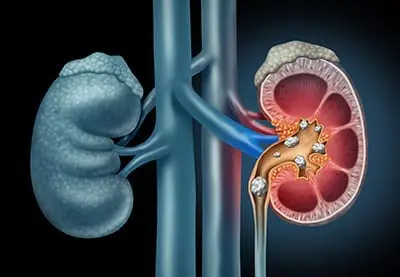What are kidney stones made of?
- Calcium
- Uric Acid
- Struvite
- Cystine
Kidney Stone Symptoms
- Urinary urgency
- Urinary frequency
- Urine that has blood in it
- Flank pain
- Nausea and vomiting

Potential Causes of Kidney Stones
- Dehydration
- Unhealthy diets
- Obesity
- Medications
- Genetics
- Family History
What are the Treatment Options for Kidney Stones
Observation/Medical Expulsive Therapy
Oftentimes the stone will pass on its own if it is small enough. Your physician may give you medications to help with the passage of the stone in addition to pain medications. He may also order repeat imaging to ensure the stone has passed.
Extracorporeal Shock Wave Lithotripsy (ESWL)
ESWL is used to treat stones in the kidney or upper part of the ureter (kidney tube). Under radiographic guidance, sound waves are used to break the stone into small fragments. These fragments then pass down the ureter. Your surgeon may recommend placement of a ureteral stent to help with passage of the stone. You will go home after your surgery is complete.
Ureteroscopy (URS)
Ureteroscopy (URS) is used to treat stones both in the kidney and ureter. A small flexible camera is placed into the bladder, and into the ureter or kidney. There are no incisions needed. Once your surgeon identifies the stone he will either use a laser or a basket device to break the stone up and remove the fragments. Most times your surgeon will place a temporary ureteral stent to help with drainage and decrease swelling after surgery. This will be removed a few days or weeks later. You will go home after your surgery is complete.
Percutaneous Nephrolithotomy (PCNL)
PCNL is the preferred treatment for large kidney stones. Your surgeon will make a small incision in your back and pass a rigid camera called a nephroscope into your kidney. He will then use a special instrument that breaks the stone up and removes the fragments simultaneously. After the surgery you may have a tube left in the kidney called a nephrostomy tube to help drain urine from your kidney and stop any bleeding. You will be admitted to the hospital overnight after this operation. Generally the nephrostomy tube will be removed prior to discharge from the hospital. Your surgeon may obtain a radiograph after surgery to ensure all stones have been removed.
